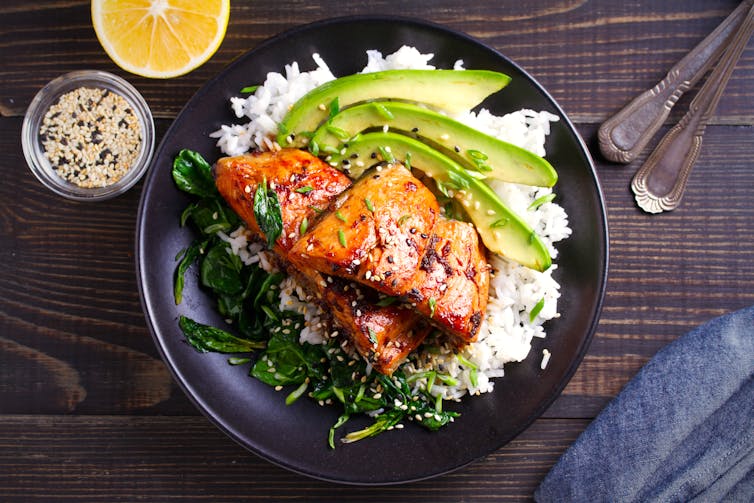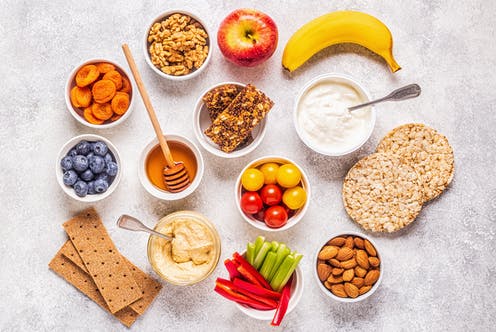There’s no shortage of articles and resources out there offering people advice on the best ways to lose weight. But not everyone wants to lose weight. For those who want to gain weight, finding good advice on how to reach the weight they desire can be harder to come by.
Whether it’s a sports person wanting to increase muscle mass, somebody recovering from a long illness or someone with a high metabolism who’s naturally thin, it can be just as difficult for some to gain weight as it is for others to lose it.
The only way to gain weight is to consume more energy (calories) than your body typically requires on a daily basis. Weight gain should also be a gradual process – around one pound a week is a realistic achievement. Gradually increasing calories with healthy foods alongside strength exercise – whatever your age – will help to ensure that the weight gained is most beneficial and can be maintained.
However, if someone is losing weight for a medical reason (such as an overactive thyroid or inflammatory bowel disease) seeking medical help to treat the underlying cause is immediate priority. Only when weight is stable can you begin to successfully gain additional pounds.
Ideally weight gain should be achieved in the healthiest way possible by considering nutrients as well as energy. Consuming extra nutrient dense foods and fluids rather than opting sugar or fat laden choices, will provide additional nutrients (including protein, vitamins, minerals, essential fats) that improve overall health and wellbeing.
Consuming 300-500 calories more per day than your body requires should lead to steady weight gain. If keeping track of calories seems too much effort, some other ways you can increase overall intake include:
-
Have larger portions at mealtimes: for those with a good appetite adding in another portion of cereal at breakfast, an extra egg or cheese slice to your lunchtime sandwich and an additional potato or spoon of pasta at dinner – or even following it with pudding – is an easy way to boost overall intake without needing to count calories.
-
Eat little and often (including snacks between meals) instead of just three main meals per day. It can sometimes be easier for those with a poor appetite to graze on smaller portions instead of consuming a big meal all at once. Trying to eat every two to three hours can also result in a more nutritious daily intake than more intermittent meals.
-
Include nutrient dense snacks such as nuts, dried fruit, cereal bars, oatcakes, crackers and cheese, breadsticks and houmous, yoghurt between meals. Not only are such snacks high energy and high protein, they also boost levels of vitamins and minerals too, such as calcium and iron – both essential to good health.
-
Including nutritious drinks throughout the day can boost total energy intake. Instead of water, try milk and milky drinks, fruit juices, smoothies. Using full fat milk in drinks and yoghurt in smoothies is another easy way to increase calories.
-
Adding cheese into soups, spreads on sandwiches or toast, and using extra oils in cooking or as dressings can help add extra calories to your meals without adding to the bulk. For example, a matchbox size piece of cheese (30g) provides 125 calories and 8g protein.
-
Incorporate healthier fats into the diet by including oily fish (such as salmon, mackerel, sardines, trout, pilchards), olives, avocado, nuts and seeds, olive, rapeseed or sunflower oils and spreads. As well as being calorie rich, they are packed with essential heart healthy fatty acids including omega 3.

freeskyline/ Shutterstock
But if a person is looking to gain muscle as well, a combination of more food and protein, with a resistance training programme is the best way to build lean tissue rather than fat tissue. Getting the recommended amount of exercise (150 minutes of moderate or 75 minutes of vigorous activity per week plus strength building exercises) will also help preserve muscle mass throughout life. Regular strength building/resistance type exercise (such as yoga, weightlifting, or circuit training) alongside a protein rich diet has been shown to promote this.
Causes of weight loss
Many factors can cause unintentional weight loss including depression, anxiety, an overactive thyroid gland, sudden illness or chronic health conditions. Rapid weight loss is of greatest concern due to loss of muscle as well as body fat. Such weight loss is common with digestive disorders (such as Crohns disease or cancers of the digestive tract. These can cause nausea, vomiting, diarrhoea, and malabsorption)
Unintentional weight loss can lead to malnutrition – and the elderly are particularly vulnerable to this. Malnutrition can in turn cause fatigue, increased risk of falls, difficulty coughing (which increases risk of chest infections) and heart failure. Weight and lean body mass can often decline as a natural part of the ageing process, with up to 50% of people 80 and older experiencing sarcopenia (muscle wasting and decreased strength).
Whether somebody has lost weight or is naturally thin, a person is classified as “underweight” if they have a body mass index (BMI) less than 18.5kg/m². This is just a starting point however. Having a low BMI doesn’t necessarily mean a person is malnourished – but it could indicate that there may be an issue around dietary intake.
Having a low body weight can also lead to health consequences, including nutritional deficiencies (such as iron deficiency anaemia and osteoporosis), lower immune function, impaired fertility, low energy and lethargy, and susceptibility to cold.
While gaining weight can be challenging for some people, eating the right foods alongside exercise, where possible, will ensure that it’s done in the healthiest way, and leads to better health overall.
![]()
Emma Kinrade does not work for, consult, own shares in or receive funding from any company or organisation that would benefit from this article, and has disclosed no relevant affiliations beyond their academic appointment.











